Reviews for October 23rd, 2009
Antichrist
Directed by Lars von Trier.

A mother (Charolotte Gainsbourg) grieves over the accidental death of her baby, who crawled through an open window and fell on a snowy night while she and her husband (Willem Dafoe) were having sex in another room. After she leaves the hospital while still depressed, her husband takes her off her medication and, in hope of healing their troubled marriage, convinces her to come along with him to the place that she fears the most: Eden, a cabin located deep in the woods where she had once spent alone with her son. Both of them gradually become mentally deranged and twisted in Eden as strange events occur around them, such as a fox that talks and a deer unaware that it has a stillborn fawn dangling from its womb. Without revealing any of the viscerally shocking moments, it’s safe to mention that most of them occur during the last 20 minutes of the film. The prior scenes feel relentlessly disturbing on a very psychological level. Writer/director Lars von Trier has a lot of courage for deviating from a standard, easy-to-swallow narrative structure and character development. He doesn’t even try to make the husband and wife likable nor does he give them names or provide you with a backstory about how exactly they had met and fallen in love with each other to begin with. There’s no denying that the stylish cinematography, lighting design and set design all richly enhance the dreamlike and eerie atmosphere throughout the film in a way that gives you a foreboding feeling that something catastrophic might happen at any given moment. Can visuals be ugly and oddly beautiful concurrently? At times, it seems so. Trier uses so many symbolic images and biblical allusions that some might consider the bombardment of stylish visuals to cross the line from artsy and clever to merely pretentious and tedious; others will be fascinated by the rich, provocative and meticulous attention to detail. At a running time of 105 minutes, Antichrist manages to be a psychologically horrifying, fascinating and emotionally devastating experience that should be studied, analyzed and discussed scene-for-scene by film buffs for its brilliant, stylish production values, allegories and allusions. Number of times I checked my watch: 2 Released by IFC Films. Opens at the IFC Center. 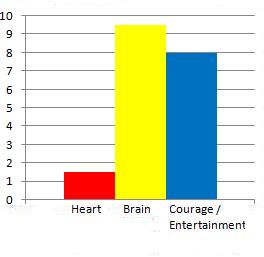
Astro Boy
Directed by David Bowers.
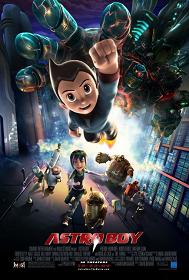
Based on the comic book series by Osamu Tezuka. Toby (voice of Freddie Highmore), a young boy, lives with his father, Dr. Tenma (voice of Nicolas Cage), in the futuristic Metro City, an island city near Planet Earth where robots perform menial labor for humans. When Toby sneaks into a top-secret weapons test run by his father, he dies in an accident, so his father decides to replace him with a life-like robot that looks like Toby and has his memories as well. The new Toby isn’t aware that he’s actually a robot that can not only have consciousness and talk, but also has superpowers, such as flying, x-ray vision and super strength. After Dr. Tenma kicks him out of the house, he uses his superpowers as he tries to avoid getting killed by the dictatorial President Stone (voice of Donald Sutherland) who destroys all robots once they’re useless. Soon enough, he, now known as Astro, befriends orphans, such as Cora (voice of Kristen Bell), who rummage through the junkyard to gather scraps of metal for Hamegg (voice of Nathan Lane), who has sinister plans of his own. He also befriends a giant robot named Zog (voice of Samuel L. Jackson). Director/co-writer David Bowers blends brilliant CGI effects with sci-fi, action, adventure and drama in a way that’s not quite as engaging as it could have been because the plot begins to drag once Astro meets the orphans. There’s not enough of a first act to get to know Toby enough so that you care about him as much as his loving father does. A few scenes do feel exhilarating and amusing though, such as when Astro flies around Metro City when he first discovers he has superpowers. After a dull second act, the third act picks up a little pace with thrills and some action sequences à la Transformers that will entertain younger audiences. However, admittedly, some scenes and provocative messages about the human race might go over young audiences’ heads and even scare them a little, which makes for an experience that’s a little more than your average Saturday morning “good vs. evil” cartoon. At a running time of 94 minutes Astro Boy is a visually stunning sci-fi movie that occasionally drags and could have used more imagination as well as some exploration of its provocative themes, but nonetheless manages to be a mostly thrilling adventure. Number of times I checked my watch: 2 Released by Summit Entertainment. Opens nationwide. 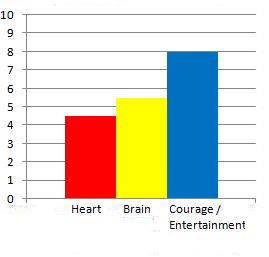
Cirque du Freak: The Vampire’s Assistant
Directed by Paul Weitz.
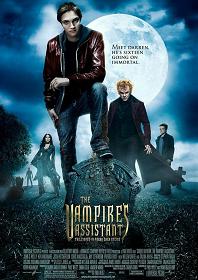
Based on the series of books by Darren Shan. Teenager Darren Shan (Chris Massoglia) and his best friend, Steve (Josh Hutcherson), find a flyer for a freak show called “Cirque du Freak,” that takes place later that night. They sneak out to attend the show at a dilapidated theater where they meet a variety of freaks, namely, Wolfman (Tom Woodruff Jr.), Gertha Teeth (Kristen Schaal), Rhamus Twobellies (Frankie Faison), Corma Limbs (Jane Krakowski), Evra the Snake Boy (Patrick Fugit), Alexander Ribs (Orlando Jones), Madame Truska (Salma Hayek), Mr. Tall (Ken Watanabe) and Larten Crepsley (John C. Reilly), a vampire with a special pet spider, Octa. When Darren steals Octa, it escapes from his backpack in school and ends up biting Steve, sending him to the hospital comatose. He returns the spider back to Crepsley and, in hopes of getting some anti-venom to save Steve’s life, he agrees to a deal with Crepsley to turn him into a half-vampire and become his assistant in exchange for the antidote. As Darren becomes more familiar with the world of the freaks, there’s a war brewing between the vampires and the much more blood-thirsty Vampineze, led by Mr. Tiny (Michael Cerveris) who turns Steve into a vampire. In a subplot, Darren meets and flirts with a monkeygirl, Rebecca (Jessica Carlson), and tries to get used to the fact that she has a tail. Unfortunately, director/co-writer Paul Weitz, who previously directed American Dreamz, In Good Company, About a Boy and American Pie, has taken an initially intriguing and imaginative premise and turns it into a meandering, painfully dull fantasy adventure with no fun, thrills or surprises to spare. Its lead actor, Chris Massoglia, lacks charisma as well as the acting chops for his character to be remotely believable or engaging for that matter. John C. Reilly adds a little refreshing campiness to his role as a vampire, but he doesn’t really have enough to sink his teeth into to make up for the rest of the forgettable and lifeless characters. It would have been great to see more of Willem Dafoe who has a small role as one of the vampires, reminding you of how captivating he was as a vampire in Shadow of the Vampire. Even the special effects here are subpar while the poor pacing and editing will make you feel as though you’re either watching a “direct-to-video” movie or the first feature film of a director who doesn’t even know how to keep audience members remotely entertained. At a running time of 108 minutes Cirque du Freak: The Vampire’s Assistant is initially fun and imaginative, but it quickly turns into a thrill-less, uneven, lazy and painfully bland mess. Number of times I checked my watch: 5 Released by Universal Pictures. Opens nationwide. 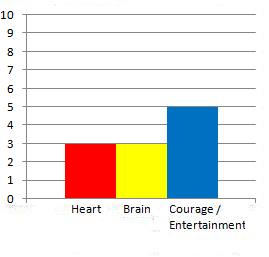
Eulogy for a Vampire
Directed by Patrick McGuinn.
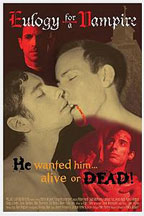
In a secluded monastery, Anthony (Sal Bardo), a young monk, lusts after a fellow monk, Fabian (Ryan G. Metzger), who refuses to act upon his sexual urges and wants to end their secret relationship, so Anthony murders him so that no other man could have him. Twenty-five years later, Anthony (now played by Wilson Hand) serves as the head priest of the monastery and forces the monks to obey strict rules that physically punishes them for any kind of sexual activity or any kind of wrongful behavior. Anthony finds a drifter, Sebastian (Angelo Tursi), laying unconscious near the monastery. Sebastian has no recollection of his own identity or how he ended up looking like he had some sort of accident. When Anthony takes a better look at him, he gradually starts to notice his resemblance to Fabian, which triggers the feelings from those sexually-charged moments of sin during his youth as a monk. Soon enough, very strange, grotesque, chaotic events begin to occur including disemboweled animals, dead monks mysteriously turning into bloodthirsty vampires and more bloody chaos. Screenwriter Andre Salas combines the genres of horror and suspense with results that fall completely flat. The dialogue sounds painfully stilted and dull while the performances are either over-the-top to the point of become irritating or merely wooden in such a way that feels as though it’s a very poor attempt at campiness. On top of that the music sounds amateurish at best while the often grain cinematography aims for style, but ends up in the realm of pretentiousness instead. Director Patrick McGuinn shows no skills at proper editing or pacing for that matter because much of the film drags---the running time of one-hour and forty-seven minutes feels more like three hours. Lars Von Trier’s Antichrist is a much better example of a stylishly grotesque horror film that’s at least somewhat intelligent and actually delivers some decent chills and scares, although on a more psychological level for the most part. There’s a fair share of stomach-churning blood and guts here, but it’s also very amateurish like the rest of the film itself. Ultimately, Eulogy for a Vampire often drags and suffers from a painfully lazy, bland and contrived screenplay. It’s a poorly-directed, lifeless mess with wooden performances and pretentious cinematography.
Number of times I checked my watch: 12 Released by Willing Suspension Films. Opens at the Quad Cinema. 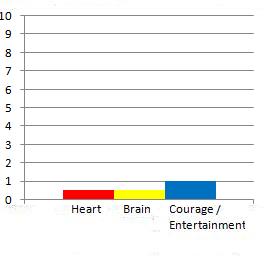
Killing Kasztner: The Jew Who Dealt With Nazis
Directed by Gaylen Ross.
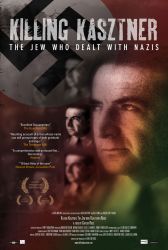
This provocative and engaging documentary focuses on the little-known Rezsö Kasztner, a Hungarian Jew who, in 1944, saved the lives of 1,685 Jews in Nazi-occupied Hungary by negotiating with Adolf Eichmann. Each spared life cost him $1,000 which the Nazis then used to purchase more trains and other supplies that aided them in extermination of the Jews. Kasztner rescued friends, family and wealthy people, although there were some people whom he didn’t know that ended up on the train that didn’t go to a concentration camp. After the war, in 1953, the Israeli government accused him of collaborating with the Nazis. The judge in the 1955 trial stated in the verdict that Kasztner “sold his soul to the devil.” He appealed the verdict, but before he was vindicated in 1958, Ze’ev Eckstein, a right-winged Israeli extremist who was part of the underground group Lehi, along with two other Lehi members, gunned him down on March 3rd, 1957 and he died 3 days later. Director Gaylen Ross does an expert job of exploring the many facets of Kasztner’s actions and motivations which shed light on the question of whether or not he deserves to be considered a hero. There’s clearly a lot of grey area when it comes to that very delicate, important question, especially given that Kasztner didn’t warn other Jews about the trains that would send them to concentration camps. Another delicate question is whether or not he actually had the means and opportunity to warn them and whether ot not they would’ve heeded his warning. Israel’s Holocaust museum, Yad Vashem, did not recognize Kasztner or even have a photograph of him at first—when they did put a poster at one point, it was requested to be taken down by his opponents. Ross includes fascinating, candid interviews with Ze’ev Eckstein and Kasztner’s daughter, Zsuzsi, who are both brave enough not only for sharing their thoughts and feelings, but for being able to confront one another face to face in an attempt for some kind of redemption. Understandably, though, the gist of that highly emotional meeting takes place in private room off-camera. It’s also interesting to watch how Holocaust survivors try to convince Yad Vashem to rightfully recognize Kasztner as a hero, which was finally accomplished in 2007. At a running time of 1 hour and 56 minutes, Killing Kasztner manages to be a well-balanced and provocative documentary that’s equally engaging, poignant and illuminating. Number of times I checked my watch: 0 Released by GR Films, Inc. Opens at the Cinema Village. 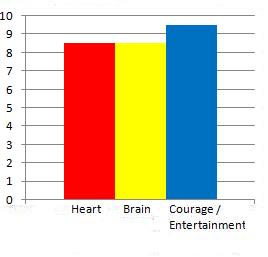
Saw VI
Directed by Kevin Greutert.
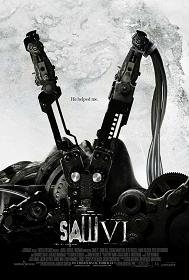
John Kramer, a.k.a. Jigsaw (Tobin Bell), still communicates his game instructions from beyond the grave through audio and video tape recordings. Back when he was alive and suffering from an illness, Jigsaw was threatened by a health insurance company that his insurance coverage will be cancelled imminently. He happened to have met William (Peter Outerbridge), an executive at the health insurance company Umbrella Health, during a party and listened to him talking about how his company essentially chooses who’s going to live and die based on a complex equation that takes into account different sets of probabilities. Not surprisingly, Jigsaw choses him as his victim, has him kidnapped and put to the test through a series of traps that force him to choose whom among his co-workers he should kill and whom he should save. If you’ve seen the prior Saw movies, you should already know that Detective Hoffmann (Costas Mandylor) has been not only investigating the Jigsaw mysteries but also works an accomplice to Jigsaw, helping him carry out his wishes post-death. Jigsaw’s widow, Jill (Betsy Russell), received a box as part of Jigsaw’s will. Its contents, which, won’t be spoiled here, serves as an integral part of the plot twists. Sure, the screenplay by co-writers Patrick Melton and Marcus Dunstan has a few plot holes that diminish its plausibility, but some of the dialogue here, especially when Jigsaw questions the morality of William’s decisions as a health insurance executive, is surprisingly intriguing. When it comes to Saw’s purely horrifying moments during the death traps, the film’s flaws can be easily forgiven by horror fans. Director Kevin Greutert includes plenty of disgusting gore that push the envelope just like in the previous Saws. The set design, lighting and editing style all help to create a very intense and chilling atmosphere. Even the musical score adds an extra layer of intensity. At a running time of 90 minutes, Saw VI manages to be intense, relentlessly horrifying, disgusting and often implausible, but surprisingly intriguing at times. Number of times I checked my watch: 1
Released by Lionsgate. Opens nationwide. 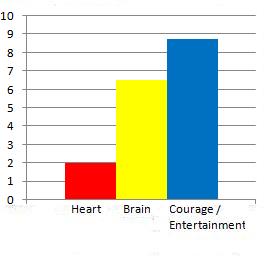
The Wedding Song
Directed by Karin Albou.
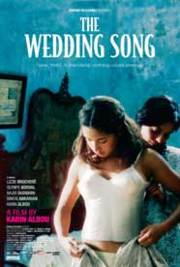
In French, Arabic and German with subtitles. In 1942 Tunis, Nour (Olympe Borval), a Muslim, lives in the same neighborhood as her childhood friend, Myriam (Lizzie Brochere). Now that they’re adults, they both face many challenges that test their friendship while the Nazis begin to occupy Tunis and spreading propaganda against the Jews. Nour wants to marry Khaled (Najib Oudghiri), but her parents won’t allow her to because he doesn’t have the job or financial means to support her. Myriam yearns to find true love and feels jealous that Nour has found hers in Khaled. In order to pay for a huge amount of debt for being Jewish, Tita (Karin Albou), Myriam’s mother, arranges her daughter to get married to Raoul (Simon Abkarian), a much older, wealthy physician whom Myriam isn’t in love with. As the Nazi forces and propaganda grow stronger, Nour and Myriam grow apart and eventually cease their friendship, but that’s when they start realizing just how much they truly need one another during those difficult times. Writer/director Karin Albou has woven a very engrossing, heartfelt drama filled with moments of tenderness and suspense. The suspense, though, comes mostly from the emotional struggles of Nour and Myriam who both come to life thanks to the raw performances by Olympe Borval and Lizzie Brochere, respectively. Those two characters feel so authentic and complex as human beings that it becomes very easy to feel immersed in their lives and to care about whether or not their friendship will ultimately endure throughout all the hardships. Albo does a terrific job of maintaining a sense of realism through the sharp attention to detail along with the leisurely pace as well. Therefore, not a single scene feels rushed, contrived or over-the-top while you’re allowed to gradually learn more about Nour, Myriam and their poignant thoughts and feelings. At a running time of 100 minutes The Wedding Song manages to be an engrossing, tender and captivating drama with heartfelt, raw performances. Number of times I checked my watch: 1 Released by Strand Releasing. Opens at the Quad Cinema. 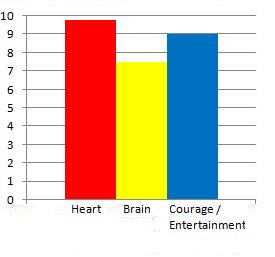
Main Page
Alphabetical Menu
Chronological Menu
______________________________________________________
|














